|
|
|
Sort Order |
|
|
|
Items / Page
|
|
|
|
|
|
|
| Srl | Item |
| 1 |
ID:
110845
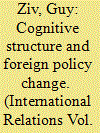

|
|
|
|
|
| Publication |
2011.
|
| Summary/Abstract |
Rationalist explanations of foreign policy change are underdetermined because they overlook the decision-makers themselves. Insight from cognitive psychology shows that individuals' cognitive structures provide a useful lens through which to understand why some people are more likely than others to change their core beliefs. Two related cognitive variables - cognitive openness and cognitive complexity - hold promise for enhancing extant explanations of foreign policy change. This article assesses the cognitive structure of the three leaders who dominated Israeli decision-making in the decade leading up to Israel's dramatic policy change vis-à-vis the PLO in 1993: Yitzhak Shamir, Yitzhak Rabin and Shimon Peres. The article demonstrates that Peres, who is found to be the most cognitively open and complex, was quicker to embrace a dialogue with the PLO than Rabin, while Shamir, who is found to hold the lowest levels of openness and complexity, rejected this move altogether. Peres, and to a lesser extent Rabin, proved to be more sensitive to international, regional and domestic changes than Shamir. This case illustrates that systemic-structural and domestic political factors are necessary, but insufficient, conditions for foreign policy change. The levels of decision-makers' cognitive openness and complexity are key to determining the likelihood that they will change their beliefs on a core policy issue that can, in turn, lead to foreign policy change. This article thus contributes to our understanding of both foreign policy change and the process leading up to the historic 1993 agreement between Israel and the PLO.
|
|
|
|
|
|
|
|
|
|
|
|
|
|
|
|
| 2 |
ID:
151683
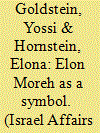

|
|
|
|
|
| Summary/Abstract |
While the establishment of the Elon Moreh locality in the second half of the 1970s constitutes an important milestone in the evolution of post-1967 Jewish settlement in the biblical lands of Judea and Samaria (or the West Bank as they have been known since their 1950 Jordanian annexation), the episode has been surprisingly neglected by the professional literature. This article seeks to fill that lacuna by exploring the factors and circumstances underlying this momentous event, as well as the political and legal struggles attending its occurrence. As such, it not only offers the first comprehensive historical account of this episode but also shed important fresh light on one of the more intractable aspects of the Israeli‒Palestinian conflict.
|
|
|
|
|
|
|
|
|
|
|
|
|
|
|
|
| 3 |
ID:
183982
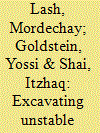

|
|
|
|
|
| Summary/Abstract |
This article examines the factors that influenced the trends in archaeological excavations in Judea and Samaria during the decade attending the 1967 Six-Day War. Examination reveals a close connection between the political trends in Israel as they pertained to Judea and Samaria and the archaeological excavations undertaken in this region. When a prime minister appeared to consider Judea and Samaria an inseparable part of the state of Israel archaeologists followed (Meir). But when prime ministers regarded Judea and Samaria as territory that would be returned to the Jordanians (Eshkol and Rabin), the archaeologists stopped excavating in the region.
|
|
|
|
|
|
|
|
|
|
|
|
|
|
|
|
| 4 |
ID:
091731


|
|
|
| 5 |
ID:
103225
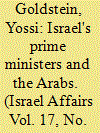

|
|
|
|
|
| Publication |
2011.
|
| Summary/Abstract |
This article identifies similar patterns of behaviour and attitudes towards Arabs and the Arab states among three of Israel's prime ministers in the first 10 years that followed the 1967 war: Levi Eshkol, Golda Meir, and Yitzhak Rabin. All three believed in the right of the Jews to the Land of Israel, in their right to return to their ancient homeland to become a majority, and in the establishment of the state of Israel as the national home of the Jewish people - a state founded on values of democracy and equal of rights for all its citizens. Convinced that the Arabs would never reconcile themselves to Jewish sovereignty in (however small) a part of the Middle East, they believed that Israel must rely on its sword if it were to survive. They differed, nevertheless, over how to achieve these goals. While Eshkol and Rabin believed that Israel should withdraw from most of the territories captured in the 1967 War as a condition for partial (Rabin) or full (Eshkol) peace, Meir did not share this view.
|
|
|
|
|
|
|
|
|
|
|
|
|
|
|
|
| 6 |
ID:
167161


|
|
|
|
|
| Summary/Abstract |
This article records my interview with Professor Ambassador Itamar Rabinovich. We discussed the keys for successful peace negotiations between Israel and the Palestinians; the differences between Camp David 1978 and Camp David 2000; The Oslo Accords; the role of the United States as a mediator and the potential of other countries to become mediators; the viability of a two-state solution; peace with Syria; Taba; Annapolis; the Israeli evacuation of Gaza, and the rise of Hamas. The interview assesses the positive and negative lessons and implications of the peace process, and the likelihood of bringing the Israeli-Palestinian conflict to a close.
|
|
|
|
|
|
|
|
|
|
|
|
|
|
|
|
| 7 |
ID:
171695
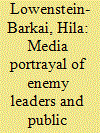

|
|
|
|
|
| Summary/Abstract |
Despite the growing number of studies analysing the role of media in peace processes, there is almost no literature on the relationship between media and public opinion during peace processes. This article examines this question using the case study of the Oslo Accords. Specifically, it analyzes the compatibility between media portrayals of Yasser Arafat and Yitzhak Rabin and Israeli and Palestinian public support for peace negotiations. The findings indicate that (a) the enemy’s binary image may change positively following the signing of peace agreements; and (b) this change may accelerate emerging peace processes.
|
|
|
|
|
|
|
|
|
|
|
|
|
|
|
|
| 8 |
ID:
192895


|
|
|
|
|
| Summary/Abstract |
Thirty years after its euphoric launch, the ‘Oslo peace process’ between Israel and the PLO stands as the worst calamity to have afflicted Israelis and Palestinians since the 1948 war, and the most catastrophic strategic blunder in Israel’s history. By replacing Israel’s control of the West Bank and Gaza Palestinians with corrupt and repressive terrorist entities that indoctrinated their subjects with burning hatred of Jews and Israelis, as well as murdered some 2,000 Israelis and rained thousands of rockets and missiles on their population centres, the Oslo process has made the prospects for peace and reconciliation ever more remote. By deflating the combative ethos of the Israel Defence Forces (IDF), it has weakened Israel’s national security and made the outbreak of a multi-front war a distinct possibility. By transforming the PLO (and, to a lesser extent, Hamas) into internationally accepted political actors without forcing them to shed their genocidal commitment to the Jewish state’s destruction, it weakened Israel’s international standing. And by deepening Israel’s internal cleavages and destabilising its sociopolitical system, it has created a clear and present danger to the Jewish State’s thriving democracy, indeed to its very existence.
|
|
|
|
|
|
|
|
|
|
|
|
|
|
|
|
| 9 |
ID:
161382


|
|
|
|
|
| Summary/Abstract |
This article records an interview with Joel Singer, one of the authors of the Oslo Accords who was brought into the process from Washington DC at a later stage of the negotiations. The Oslo channel was established by Deputy Foreign Minister Yossi Beilin, Norwegian academic Terje Rød-Larsen and Israeli academic Yoel Hirschfeld, who understood Yasser Arafat’s need to initiate a new path for relationships with Israel. At that time, negotiations with the Palestine Liberation Organization (PLO) were illegal. The PLO was considered a terrorist organisation and the Israeli government refused to officially negotiate with Arafat, though it was clear that he was still the person most able to strike a deal, and the only true representative of the Palestinian people. Bilateral negotiations begun in Washington between Israelis and Palestinians who were supposedly independent of the PLO led to nowhere. This is Singer’s version of this peace chapter. The article assesses the positive and negative aspects, lessons and implications of the process and of the Oslo Accords.
|
|
|
|
|
|
|
|
|
|
|
|
|
|
|
|
| 10 |
ID:
105326
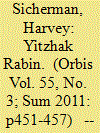

|
|
|
| 11 |
ID:
139150
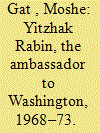

|
|
|
|
|
| Summary/Abstract |
Rabin differed considerably from the average ambassador – a representative receiving and issuing reports. He viewed himself not only as a diplomat, but as capable of shaping policy with respect to both the Arab–Israeli conflict and the relationship with the United States. During his term as ambassador to Washington he displayed sober realism with regard to the political, and to some extent the military, reality – the very realism that was absent from the government that sent him.
|
|
|
|
|
|
|
|
|
|
|
|
|
|
|
|
|
|
|
|
|